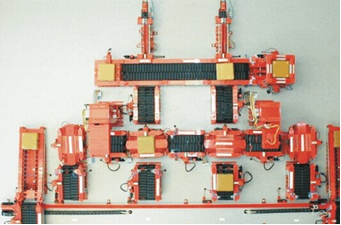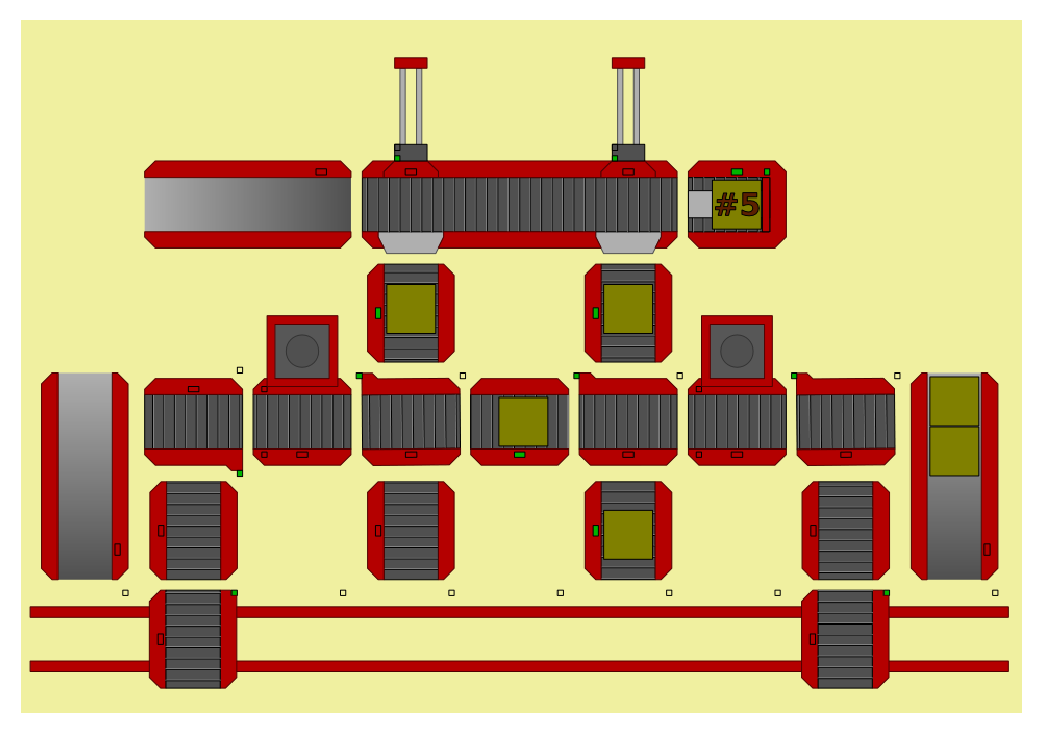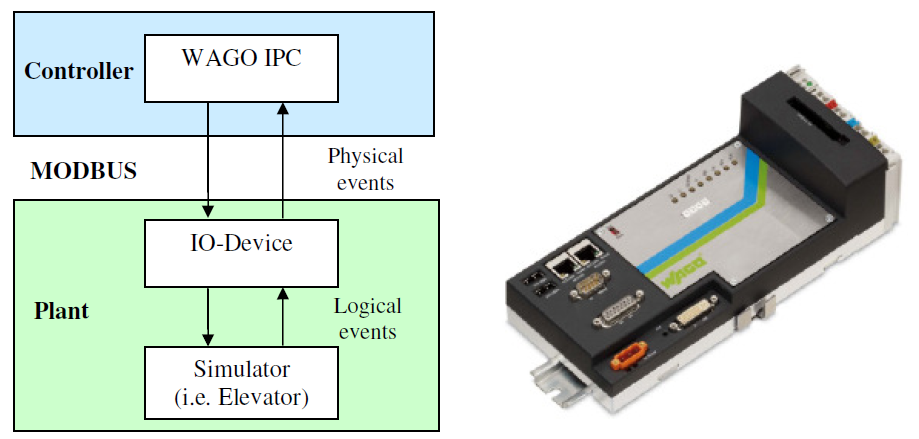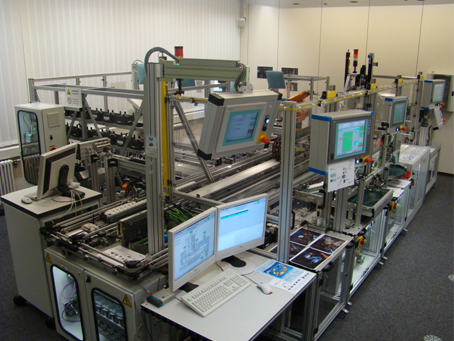| |
|
|||||
|
|
||||||
Applied Discrete Event Systems
The literature on discrete event systems has reported solutions to many application relevant problems, including model based controller design with provably correct closed-loop behaviour. However, in the context of industrial automation, we observe a considerable gap between available methods and engineering practice.
One reason perhaps is the "never change a running system" paradigm: the PLC code for the one application is derived from the predecessor project and thus benefits from a substantial amount if accumulated expertise. Here, a fundamental change in the design process that invalidates the expertise gathered so far must provide more than "just a running system".
In the project Applied Discrete Event Systems we conduct case studies to evaluate model based synthesis methods in an industrial automation context. We want to learn more about the roadblocks that prevented a wider application so far, and about the features of a design method that would be most appreciated.
Code Generation for Programmable Logic Controllers
In the context of industrial automation, programmable logic controllers (PLCs) have evolved to a defacto standard. PLCs are designed to execute cyclic programs, that implement the desired control strategy by interacting with the physical plant. When a formal plant model and a formal specification are available, the control strategy can be synthesized by methods of supervisory control theory. However, a number of relevant synthesis methods return their result as one or more finite automata. In order to apply such a control strategy via a PLC to a physical plant, the automata must be converted PLC code.

Controller synthesis in an industrial automation context.
This project aims for a code generator, that takes the automata result from the synthesis stage as input data in order to produce IEC 61131-3 compliant PLC code. A particular emphasis is on implementing execution semantics that match the synchronous product for multiple automata and that adequately maps the modelling paradigm of controllable and uncontrollable events to the physical situation of actuator and sensor signals.
Project outline:
Isolation of self-contained parts in a PLC-program.
Improving and extending existing approaches to PLC-code generation.
Validation in the context of several experimental set-ups, including SoftPLCs, physical plant simulations, laboratory experiments.
We have had a number of students contributing to this project over the last years. As of 2016, we have consolidated the code basis by a re-design from scratch to achieve consistent execution semantics for a range of target platforms; see also CompileDES. Future projects will address validation in the context of a large scale application. Students, who decide to contribute in course of their masters- or bachelor-project, will have the opportunity to acquire and extend programming skills on industrial control platforms.
Interactive simulation of manufacturing systems
A typical manufacturing system is composed from a number of components for workpiece transport and workpiece processing. Once the plant is set up, fundamental changes in the component layout are expensive if possible at all. Therefore Computer Aided Design ideally provides simulation facilities to support an evaluation of the various design stages before setting up the actual plant.

Manufacturing system (laboratory model) |

Manufacturing System (simulator) |
This project aims for an interactive simulator for manufacturing systems that are configured from the same components as the LRT laboratory model (see above). The simulator will complement our controller design tools and demonstrate how Computer Aided Design can account for non-trivial discrete-event dynamics.
Project outline:
Elaboration of an appropriate concept for a simulation software of a production system.
Development of a graphical user interface (GUI) that can be used for PC-based modelling of production systems and simulation of possible material flows.
Design of templates of system components based on the laboratory model of a manufacturing system.
Test of the elaborated software for usability.
So far, a functional prototype of the simulator has been implemented. Future work can be based on this prototype and direct towards design and evaluation of our tool-chain for distributed/hierarchical control architectures. We are currently seeking qualified students to contribute in course of their masters- or bachelor-project. Students will have the opportunity to acquire and extend skills in discrete event systems modelling and controller synthesis.
Implementation of a Modbus/TCP module for the libFAUDES simulator
On possible avenue to implement a discrete event systems controller is to simulate the controller dynamics in the libFAUDES simfaudes and synchronize the controller simulation with the physical plant. For this purpose, simfaudes provides a software interface for interaction with digital I/O components.
The aim of this project is to use the provided interface to access external I/O devices via the Modbus/TCP protocol. The latter was originally developed by Modicon as a specific protocol for the communication between programmable logic controllers (PLCs). It is based on Master/Slave or Client/Server architecture and can be used for TCP communication via Ethernet where it has established itself as one of the de-facto standards.

Possible test configuration for Modbus communication and possible test device (WAGO industry PC)
Project outline:
Implementation of an interface for reading and writing data via the Modbus process interface.
Extension of the already existing IO-device interface of the libFAUDES library.
Test of the Modbus interface with different hardware configurations (communication between a WAGO industry PC, a normal PC and an elevator hardware).
So far, an elementary implementation of the Modbus/TCP protocol has been integrated with libFAUDES. It has been tested in the context of the LRT manufacturing system simulator. Future activities will include a more thorough evaluation with the WAGO IPC, a SoftPLC and a Siemens PLC. We are currently seeking qualified students to contribute in course of their bachelor-project. Students will have the opportunity to acquire and extend skills in digital communication networks for industrial automation.
Discrete event system diagnosis:
an industrial automation case study
The task of a diagnoser is to observe a closed-loop system and to detect faults, i.e. discrepancies between actual behaviour and a nominal model. For discrete event systems, the problem of diagnoser synthesis is of polynomial complexity and can be solved efficiently for system components of application relevant complexity. For the situation of multiple interacting components, approaches for modular and decentralized diagnosis have been proposed; see libFAUDES, Diagnoser plug-in, for an implementation of selected algorithms and further references.

In order to make the theoretical results available for real-world applications, we conduct a case study for a prototypical manufacturing plant, designed by and located at Siemens AG, Advanced Technologies & Standards (ATS), Nürnberg. The plant serves as a technology demonstrator and is thus equipped with numerous state-of-the-art devices from industrial automation.

SmartAutomation plant at Siemens AG, Advanced Technologies & Standards (ATS), Nürnberg.
Project outline:
Identification of one or more plant components that potentially exhibit faulty behaviour. Locate critical aspects of mechanical components. Locate potentially unreliable sensors or actuators.
Development of a formal model of relevant components to represent nominal and faulty plant behaviour. Apply known results from the literature to test formal diagnosability and synthesize a diagnoser.
Inspection of the established software engineering work-flow and the resulting software infrastructure (PLC code). How is component interaction implemented? How should the software interface of a diagnoser add-on be designed?
Further develop and fine-tune existing code-generators to translate the formal outcome of the diagnoser synthesis to executable PLC code that integrates well will the existing infrastructure.
Nicolas Rüffler addresses the above questions in his diploma thesis Applied discrete event systems: a diagnoser case study, 2011. Jointly supervised by LRT/FGDes and Siemens AG, Advanced Technologies & Standards (ATS), Nürnberg, his thesis provides constructive answers, including the evaluation of two experimental setups. The code-generator will be used as a basis for further projects that address the implementation of discrete-event controllers. Please let us know if you are interested in further details to this project.